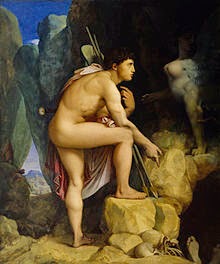“I am blind and old, Antigone, my child.”
Now blind and aged, Oedipus, with his daughter, Antigone, arrive at a place just outside of Athens called Colonus. Though warned by a villager that this place in which they wish to reside is sacred, possessed by the all-seeing Eumenides (Furies), a land of Poseidon and Prometheus, and the founding stone of Athens, Oedipus refuses to leave. A past prophecy has determined that the sacred grove of the Eumenides at Colonus, will be the site of his death, and here he is determined to stay.
 |
| Oedipus at Colonus Jean-Antoine-Théodore (1788) source Wikipedia |
When a chorus of men of the city arrive and, upon learning the identity of Oedipus, they attempt to persuade him to depart from their city, fearing his curse will bring trouble to them. Oedipus defends his position by agruing that because he had no knowledge of his crimes, he is therefore not responsible for the consequences, in particular, claiming self-defence in the murder of his father, Laius.
 |
| Oedipus at Colonus Fulchran-Jean Harriet (1798) source Wikipedia |
Denouncing them all as villains, Oedipus meets with Theseus, King of Athens who shows sympathy for his predicament, offering unconditional protection and making him a citizen of his country. How Oedipus praises his saviour, and declares that his beneficent actions will ensure Athens victory in any altercation with Thebes!
When Theseus exits, Antigone announces the advent of Creon. At first, he attempts to manipulate Oedipus using pity, but when he sees this tact will not bring him success, he admits to kidnapping Ismene, and grabs Antigone to forcibly take her away. Theseus returns in kingly grandeur to scold Creon, then the Athenians overpower the Thebians, returning both girls to their father.
 |
| Oedipus Cursing Polynices (1786) Henri Fuseli source Wikipedia |
One thinks that at last Oedipus might get some peace in his last hours, but it is not to be. Informed by Theseus that a suppliant has arrived to speak with him, he learns it is his son, Polynices, who begs his father to release the curse he had placed on his sons for their part in his banishment from Thebes, knowing that their conflict is a result of the curse. Oedipus, in complete disgust of his offspring, refuses and Polynices exits to meet his near-certain fate.
A thunderstorm ensues, which portends Oedipus’ passing. Oedipus gifts Theseus with the promised gift of protection for Athens and then passes into Hades. When Antigone wishes to see his tomb, Theseus refuses in response to a promise to Oedipus, never to reveal the location of his tomb. Antigone departs to attempt to stop her brothers’ conflict.
There is a curious dichotomy in this play with regard to the character of Oedipus. In spite of the fact he is an exiled, blind old man, with a terrible curse upon him, rarely do you find him subject to the other characters. In fact, Antigone listens closely to his counsel, he has a command and influence over Theseus, he manages to overcome Creon, and also best his son by refusing to assist him. On the outside, he is aged, infirm and at the mercy of his hosts, but in actuality, Oedipus is the master of each situation.
Yet Oedipus also places emphasis on his innocence with regard to his crimes. Again and again, he proclaims to the chorus of Athenian men that he had no pre-knowledge of his transgressions and was, therefore, blameless. This was a different reaction from Oedipus Rex, where he seemed to take the crimes on to himself, and punish himself for them.
.jpg!xlMedium.jpg) |
| The Death of Oedipus (1784) Henry Fuseli source Wikipedia |
While on one level, the trials and sufferings born by Oedipus seemed somewhat random in Oedipus Rex, in Oedipus at Colonus we see a culmination of prophecy. By his exile, Oedipus is brought to the sacred grove of the Eumenides (Furies), fulfilling prophecy, and although this exile was brought about by a curse, Oedipus is actually turned into a hero-type figure by bringing blessing and protection upon the important city of Athens.
Of the 123 plays that Sophocles wrote, only seven complete plays have survived. That makes me want to cry. However, parts of plays are still being discovered. In 2005, additional fragments of a play about the second siege of Thebes, Epigoni, were discovered by employing infrared technology by classicists at Oxford University. So there is hope that the ancients can still speak to us through time (and new technology) and, as Gandalf said, that is a very comforting thought, indeed!
The book was completed for my Classics Club Spin #6.
Translated by David Grene
Edited by David Grene & Richard Lattimore













.jpg)








.jpg)





